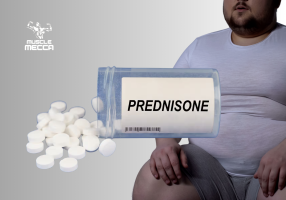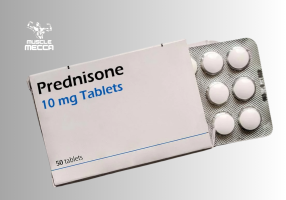Testosterone Tide
Member
Author
- Joined
- Apr 13, 2025
- Messages
- 20
- Points
- 1
Hey there, it's TestosteroneTide. I’ve spent years optimizing cycles, battling bloat, and navigating hormonal chaos, so believe me when I say I know a thing or two about what happens when powerful drugs enter the picture. Today, we’re diving into the link between prednisone, weight gain, and metabolism.
What Is Prednisone and Why Is It Prescribed
Prednisone is a laboratory-created steroid medication that helps manage inflammation and modulate the immune system’s activity. Think of conditions like rheumatoid arthritis, lupus, asthma, inflammatory bowel disease, and even severe allergic reactions. Users can take it short-term to handle a flare-up or long-term for chronic conditions.
Now, prednisone isn’t part of any PED stack I’d recommend for muscle growth. Still, it does have potent effects on the endocrine system, especially if you’re already manipulating hormones with TRT or other compounds. That’s where things can get complicated.
Second, prednisone leads to fluid retention and bloating, especially if you have a high sodium intake. Then there’s fat redistribution. You’re not just gaining weight. You’re gaining it in specific places. We’ll talk about that more in a second.
Dose and duration matter. A short, high-dose burst of prednisone might leave you puffy for a week or two. But long-term use? That’s when the real body composition changes start to hit.
Prednisone can cause your blood sugar to spike and your body to start storing fat more efficiently, especially visceral fat around your midsection. It’s like it teaches your body to get fat and stay fat. Not cool.

Bloating is another big issue. Prednisone messes with your fluid balance, leading to sodium retention and potassium loss, which throws off everything from muscle contractions to blood pressure. So even if your calorie intake is the same, you’ll look and feel heavier.
Long-term, the changes get sneakier. Muscle wasting, reduced strength, and higher body fat percentage, even if the number on the scale doesn’t change dramatically. Your lean mass drops while your fat mass rises.
We’re talking metabolic slowdown, suppressed testosterone, insulin resistance, and even bone loss, which is bad news for any lifter. Osteoporosis isn’t just a senior citizen problem when prednisone is in the mix. Your joints and tendons become more vulnerable, making intense training a risk.
Weight gain becomes tougher to reverse because your hormonal baseline is off. You can’t just train harder or cut calories. You need a strategy that takes the whole endocrine picture into account.

Managing your physique on prednisone is a challenge. But it’s not impossible.
Start with an anti-inflammatory diet. Cut processed foods, keep sodium low, and load up on greens, lean proteins, and healthy fats. Hydrate like your physique depends on it because it does. And for the love of gains, don’t cut all your carbs. You’ll need stable blood sugar and energy levels to manage cravings and stay anabolic.
Training? Keep it consistent but intelligent. Go lighter on high-impact movements if your joints are inflamed. Concentrate on strength training to keep your muscle tissue intact while including steady-paced cardiovascular exercises to enhance your body’s response to insulin.
Work with your doctor and keep your bloodwork tight. If you’re already on TRT or a blast/cruise cycle, let your doctor know. Mixing prednisone with other hormones without supervision is a bad move.
Sometimes, doctors will taper your prednisone dosage slowly or look at alternatives if the side effects are wrecking your quality of life. But never stop cold turkey. You could crash your adrenal system, and that’s a whole new world of misery.
Be honest with your healthcare provider about any other substances or cycles you're running. The more they know, the better they can help you stay safe and keep your hormones in check.

Is prednisone bloating the same as fat gain?
Not exactly. Bloating is water retention and can resolve faster. Fat gain is more permanent and results from metabolic changes and increased appetite.
Is prednisone a steroid like testosterone?
No. It’s a corticosteroid, not an anabolic steroid. It has anti-inflammatory and immunosuppressive effects, but doesn’t build muscle.
Does prednisone interfere with PED cycles?
Yes. It can blunt testosterone levels, increase cortisol, and interfere with your hormonal balance. Always consult a doctor if you’re stacking compounds.
What Is Prednisone and Why Is It Prescribed

Prednisone is a laboratory-created steroid medication that helps manage inflammation and modulate the immune system’s activity. Think of conditions like rheumatoid arthritis, lupus, asthma, inflammatory bowel disease, and even severe allergic reactions. Users can take it short-term to handle a flare-up or long-term for chronic conditions.Now, prednisone isn’t part of any PED stack I’d recommend for muscle growth. Still, it does have potent effects on the endocrine system, especially if you’re already manipulating hormones with TRT or other compounds. That’s where things can get complicated.
Understanding Prednisone’s Role in Weight Gain
Yes, prednisone can absolutely make you gain weight. It does this through multiple mechanisms. First off, it increases your appetite like crazy. If you’re used to clean, controlled meals, you might suddenly find yourself raiding the pantry at midnight like a starving animal.Second, prednisone leads to fluid retention and bloating, especially if you have a high sodium intake. Then there’s fat redistribution. You’re not just gaining weight. You’re gaining it in specific places. We’ll talk about that more in a second.
Dose and duration matter. A short, high-dose burst of prednisone might leave you puffy for a week or two. But long-term use? That’s when the real body composition changes start to hit.
How Prednisone Affects Your Metabolism
Prednisone suppresses your hypothalamic-pituitary-adrenal (HPA) axis, which means your natural cortisol production shuts down. Your body becomes dependent on the synthetic stuff. That throws off your thyroid hormones, slows down your basal metabolic rate, and increases your risk of insulin resistance. Sound familiar? It’s like the opposite of what we try to achieve with a clean anabolic cycle.Prednisone can cause your blood sugar to spike and your body to start storing fat more efficiently, especially visceral fat around your midsection. It’s like it teaches your body to get fat and stay fat. Not cool.
Visible and Hidden Physical Changes
The first signs you’ll notice are facial puffiness (moon face), abdominal fat, and sometimes a fat pad that develops on the back of the neck called a buffalo hump. That’s not from hitting your delts too hard, by the way. It’s from hormonal shifts that change where your body stores fat.Bloating is another big issue. Prednisone messes with your fluid balance, leading to sodium retention and potassium loss, which throws off everything from muscle contractions to blood pressure. So even if your calorie intake is the same, you’ll look and feel heavier.
Long-term, the changes get sneakier. Muscle wasting, reduced strength, and higher body fat percentage, even if the number on the scale doesn’t change dramatically. Your lean mass drops while your fat mass rises.
Long-Term Use and Its Compounding Effects
Stacking prednisone over months or years? That’s where things spiral.We’re talking metabolic slowdown, suppressed testosterone, insulin resistance, and even bone loss, which is bad news for any lifter. Osteoporosis isn’t just a senior citizen problem when prednisone is in the mix. Your joints and tendons become more vulnerable, making intense training a risk.
Weight gain becomes tougher to reverse because your hormonal baseline is off. You can’t just train harder or cut calories. You need a strategy that takes the whole endocrine picture into account.
How to Manage Weight While Taking Prednisone
Managing your physique on prednisone is a challenge. But it’s not impossible.Start with an anti-inflammatory diet. Cut processed foods, keep sodium low, and load up on greens, lean proteins, and healthy fats. Hydrate like your physique depends on it because it does. And for the love of gains, don’t cut all your carbs. You’ll need stable blood sugar and energy levels to manage cravings and stay anabolic.
Training? Keep it consistent but intelligent. Go lighter on high-impact movements if your joints are inflamed. Concentrate on strength training to keep your muscle tissue intact while including steady-paced cardiovascular exercises to enhance your body’s response to insulin.
Work with your doctor and keep your bloodwork tight. If you’re already on TRT or a blast/cruise cycle, let your doctor know. Mixing prednisone with other hormones without supervision is a bad move.
When to Seek Medical Guidance
You should always pay attention to warning signs like rapid weight gain, persistent bloating, mood swings, or blood sugar crashes. These are red flags that your metabolism is going haywire.Sometimes, doctors will taper your prednisone dosage slowly or look at alternatives if the side effects are wrecking your quality of life. But never stop cold turkey. You could crash your adrenal system, and that’s a whole new world of misery.
Be honest with your healthcare provider about any other substances or cycles you're running. The more they know, the better they can help you stay safe and keep your hormones in check.
Frequently Asked Questions
Is prednisone bloating the same as fat gain?Not exactly. Bloating is water retention and can resolve faster. Fat gain is more permanent and results from metabolic changes and increased appetite.
Is prednisone a steroid like testosterone?
No. It’s a corticosteroid, not an anabolic steroid. It has anti-inflammatory and immunosuppressive effects, but doesn’t build muscle.
Does prednisone interfere with PED cycles?
Yes. It can blunt testosterone levels, increase cortisol, and interfere with your hormonal balance. Always consult a doctor if you’re stacking compounds.
















